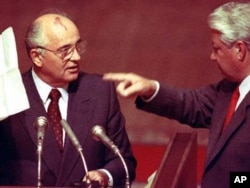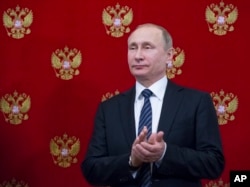The White House has denied media reports that a so-called “deep state” of the United States government is withholding information from President Donald Trump in an effort to undermine his administration.
The “deep state” — a term apparently first used in Turkey in the 1990s — refers to a secretive, informal network of officials in a country’s military, intelligence and security services, and other parts of the government, who have influence, regardless of the administration formally in power. The term has been used to describe the situation in countries with a history of rule by the military, like Turkey, Pakistan and Egypt.
Citing current and former officials, a recent Wall Street Journal story reports that U.S. intelligence officials — considered to be part of an American “deep state” — have withheld sensitive intelligence from the president over concerns it could be leaked or compromised. An unnamed White House official denied this in the Journal piece, saying, "There is nothing that leads us to believe that this is an accurate account of what is actually happening."
So, what exactly is this supposed “deep state” that has been referenced by news organizations from Fox News to The New Yorker magazine?
It is based on the notion that American presidents come and go, but a permanent bureaucracy that includes intelligence agencies, national security and the U.S. military remains in place.
The term also implies that what happens at the very top of the United States government may be to a greater or lesser degree just window dressing, and that beneath the surface are those with real power (for example, Cabinet-level deputies who stay in place during a change of administration), deciding what policies will be implemented.
Historic examples include the Soviet era under Mikhail Gorbachev, whereby the KGB was publicly denounced, “glasnost” and “perestroika” were encouraged and, ultimately, the entire Soviet Union fell apart.
Russian experts point out, just a decade or so later, a mid-level KGB official named Vladimir Putin becomes president.
Other analysts say the American public learned of a kind of “deep state” after the 9/11 terror attacks under former President George W. Bush. During his two terms, there were reports of torture, CIA secret prisons and the National Security Agency listening in on Americans' private conversations without warrants.
Under President Trump, very public tensions have erupted with members of the bureaucracy in a manner that observers say never have happened before in modern American history.







